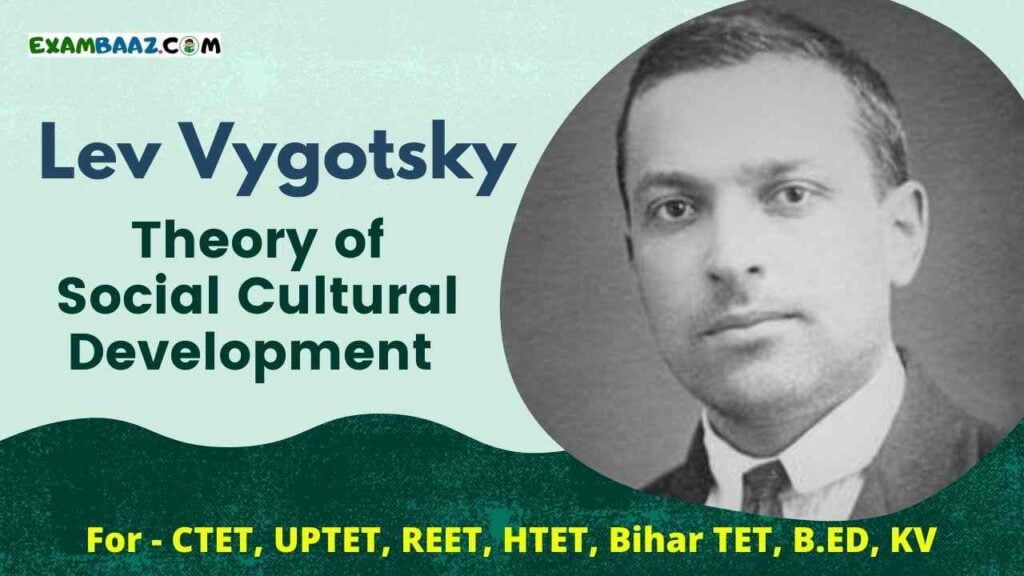CTET Theory of Vygotsky Practice MCQ: आज यानी 24 नवंबर 2022 केंद्रीय शिक्षक पात्रता परीक्षा की आवेदन प्रक्रिया शामिल होने की अंतिम तिथि है ऐसे में जिन उम्मीदवारों ने अपने आवेदन अभी तक जमा नहीं किए हैं वह जल्द ही ऑफिशल वेबसाइट पर अपने आवेदन कर सकते हैं बता दे की परीक्षा का आयोजन दिसंबर से जनवरी माह के मध्य ऑनलाइन सीबीटी मोड पर किया जाएगा जिसमें शामिल होने वाले अभ्यर्थियों को अपनी तैयारियां शुरू कर देनी चाहिए ताकि 1 अंकों के साथ सफलता हासिल की जा सके आज के इस आर्टिकल में हम एग्जाम पैटर्न पर आधारित वाइगोत्स्की के सिद्धांत से पूछे जाने वाले कुछ महत्वपूर्ण प्रश्नों (CTET Theory of Vygotsky Practice MCQ) को लेकर आए हैं, जिनका अभ्यास आपको परीक्षा में सफलता दिलाने में सहायक होगा इसलिए नजर जरूर पढ़ ले.
आगामी शिक्षक पात्रता परीक्षा की दृष्टि से बेहद महत्वपूर्ण है, वाइगोत्सकी से जुड़े यह सवाल—CTET 2022 important Practice MCQ On Theory of Vygotsky
1. A teacher wishes to help her students to appreciate multiple views of a situation. She provides her students multiple opportunities to debate on this situation in different groups. According to Vygotsky’s perspective, her students will ————– various views and develop multiple perspectives of the situation on their own.
एक शिक्षिका अपने शिक्षार्थियों की इस रूप में मदद करना चाहती है कि वे एक स्थिति की अनेक दृष्टिकोणों की सराहना कर सकें। वह विभिन्न समूहों में एक स्थिति पर वाद-विवाद करने के अनेक अवसर उपलब्ध कराती है। वाइगोत्स्की के परिप्रेक्ष्य के अनुसार उसके शिक्षार्थी विभिन्न दृष्टिकोणों को ————– करेंगे और अपने तरीके से उस स्थिति के अनेक परिप्रेक्ष्य विकसित करेंगे।
(a) Internalize /आत्मसात
(b) Construct/निर्माण,
(c) Operationalize /संक्रियाकरण
(d) Rationalize/तर्क संगत
Ans- b
2. Which of the following is based on Vygotsky’s sociocultural theory?/निम्नलिखित में से कौन-सा वाइगोत्स्की के सामाजिक-सांस्कृतिक सिद्धान्त पर आधारित है?
(a) Operant conditioning/सक्रिय अनुकूलन
(b) Reciprocal teaching/पारस्परिक शिक्षण
(c) Culture-neutral cognitive development/संस्कृति-निरपेक्ष संज्ञानात्मक विकास
(d) Insight learning/अन्तर्दृष्टिपूर्ण अधिगम
Ans- b
3. Vygotsky emphasized the significance of the role played by which of the following factors in the learning of children?/वाइगोत्स्की बच्चों के सीखने में निम्नलिखित में से किस कारक की महत्त्वपूर्ण भूमिका पर बल देते हैं?
(a) Hereditary/आनुवंशिक
(b) Moral/नैतिक
(c) Physical/शारीरिक
(d) Social/सामाजिक
Ans- d
4. Vygotsky theory implies/वाइगोत्स्की के सिद्धांत का निहितार्थ है
(a) Collaborative problem solving/सहयोगात्मक समस्या समाधान
(b) Individual assignments to each student/प्रत्येक विद्यार्थी को व्यक्तिगत रूप से दत्त कार्य देना
(c) After initial explanation, do not support a child in solving difficult questions/प्रारंभिक व्याख्या के बाद कठिन सवालों को हल करने में बच्चे की सहायता न करना
(d) Child will learn best in the company of children having IQ lesser than his/her own/बच्चे उन बच्चों की संगति में श्रेष्ठतम रूप से सीख सकते हैं जिनका बुद्धि लब्धांक उनके बुद्धि लब्धांक से कम होता है।
Ans- a
5. Thought not only determines language, but also precedes it” was an idea put forward by/“विचार न केवल भाषा को निर्धारित करते हैं बल्कि उसे आगे भी बढ़ते हैं।” यह विचार ————– द्वारा रखा गया।
(a) Jean Piaget/जीन पियाजे
(b) Kohlberg/कोहलबर्ग
(c) Vygotsky/वाइगोत्स्की
(d) Pavlov/पैवलॉव
Ans- a
6. Vygotsky emphasized the significance of the role played by which of the following factors in the learning of children?/ वाइगोत्स्की बच्चों के सीखने में निम्नलिखित में से किस कारक की महत्त्वपूर्ण भूमिका पर बल देते हैं?
(a) Physical/शारीरिक
(b) Social/सामाजिक
(c) Hereditary/आनुवंशिक
(d) Moral/नैतिक
Ans- b
7. In Vygotsky’s theory, which aspect development gets neglected?/वाइगोत्स्की के सिद्धांत में, विकास के किस पहलू को नज़रअंदाज किया जाता है?
(a) Social/सामाजिक
(b) Cultural/सांस्कृतिक
(c) Biological /जैविक
(d) Linguistic/भाषायी
Ans- c
8. When children learn a concept and use it, practice helps in reducing the errors committed by them. This idea was given by/ जब बच्चे एक अवधारणा को सीखते हैं और उसका प्रयोग करते हैं, तो अभ्यास उनके द्वारा की जाने वाली त्रुटियों को कम करने में मदद करता है। यह विचार ————– के द्वारा दिया गया।
(a) E.L. Thorndike /ई.एल. थॉर्नडाइक
(b) Jean Piaget/पियाजे
(c) J.B. Watson/जे.बी. वॉटसन
(d) Lav Vygotsky/लेव वाइगोत्स्की
Ans- a
9 According to Socio-cultural theory of Vygotsky/वाइगोत्स्की के सामाजिक-सांस्कृतिक सिद्धांत के अनुसार
(a) Culture and language play a crucial role in development/संस्कृति और भाषा विकास में महत्त्वपूर्ण भूमिका निभाते हैं
(b) The child thinks in different domains and does not take a complete perspective/बच्चे अलग क्षेत्र में चिंतन करते हैं और वे पृण्र परिप्रेक्ष्य नहीं लेते
(c) Children think in abstract terms if presented abstract material at a lower age/यदि निम्न आयु पर अमूर्त सामग्री को प्रस्तुत किया जाए तो बच्चे अमूर्त तरीके से चिंतन करते हैं
(d) Self-directed speech is the lowest stage of the scaffold/स्व:निर्देशित वाक् सहयोग का निम्नतम स्तर है
Ans- a
10. Which one of the following statements best summarizes the relationship between development and learning as proposed by Vygotsky?/निम्नलिखित कथनों में से कौन-सा वाइगोत्स्की के द्वारा प्रस्तावित विकास तथा अधिगम के बीच सम्बन्ध का सर्वश्रेष्ठ रूप में सार प्रस्तुत करता है?
(a) Development is independent of learning./विकास अधिगम से स्वाधीन है।
(b) Development process lags behind the learning process./विकास प्रक्रिया अधिगम प्रक्रिया से पीछे रह जाती है।
(c) Development is synonymous with learning process./विकास अधिगम का समानार्थक है।
(d) Learning and development are parallel processes./अधिगम प्रक्रियाएँ हैं। एवं विकास समानान्तर
Ans- d
11. A major difference between the perspectives of Vygotsky and Piaget pertains to/वाइगोत्स्की तथा परिप्रेक्ष्यों में एक प्रमुख विभिन्नता है।
(a) Their critique of behaviouristic principles/व्यवहारवादी सिद्धांतों की उनकी आलोचना।
(b) The role of providing a nurturing environment to children/बच्चों को एक पालन-पोषण का परिवेश उपलब्ध कराने की भूमिका।
(c) Their views about language and thought . /भाषा एवं चिन्तन के बारे में उनके दृष्टिकोण
(d) The conception of children as active constructor of knowledge/ज्ञान के सक्रिय निर्माताओं के रूप में बच्चों की संकल्पना।
Ans- c
12. Which one of the following statements about children would Vygotsky agree with?/बच्चों के बारे में निम्नलिखित कथनों में से किस कथन से वाइगोत्स्की सहमत होते?
(a) Children learn through social interaction with peers and adults./ बच्चे समवयस्कों और वयस्कों के साथ सामाजिक अंतःक्रियाओं के माध्यम से सीखते हैं।
(b) Children learn when they are offered lucrative rewards./बच्चे तब सीखते हैं जब उनके लिए आकर्षक पुरस्कार निर्धारित किए जाएँ
(c) Children’s thinking can be understood by conducting laboratory experiments on animals./बच्चों के चिंतन को तब समझा जा सकता है जब प्रयोगशाला में पशुओं पर प्रयोग किए जाएँ।
(d) Children are born ‘evil’ and need to be controlled through punishment./बच्चे जन्म से शैतान होते हैं और उन्हें दंड देकर नियंत्रित किया जाना चाहिए
Ans- a
Read More:
For Latest Update Please join Our Social media Handle
| Join us on Telegram – Click Here |
| Follow Facebook – Click Here |
| Follow us on Twitter – Click Here |

